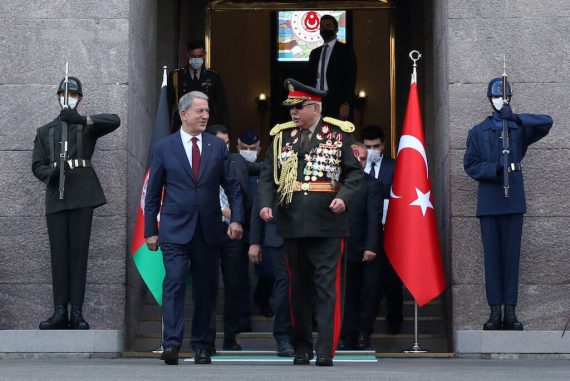The United States is preparing to leave Afghanistan soon and “from the moment they leave, the only reliable country to maintain the process over there is obviously Turkey,” stated President Recep Tayyip Erdoğan during the recent NATO summit in Brussels. President Erdoğan met U.S. President Joe Biden during the NATO summit. Erdoğan stated that Turkey would need “diplomatic, logistic, and financial assistance” from the United States to maintain troops in Afghanistan following the withdrawal of NATO troops.
The NATO summit decided to continue its economic and humanitarian assistance to Afghanistan. Turkey is the only Muslim member country of NATO, which has 500 troops in Afghanistan. Should Ankara decide to stay in Afghanistan, it might increase the number of troops to guard the Kabul airport as the international community’s main gateway to the country. After 20 years of combat with the Taliban, President Biden announced the withdrawal of the U.S. forces from Afghanistan and asserts that there is no military solution to the Afghan conflict. However, why would Turkey become engaged in post-U.S. Afghanistan?
Efforts to revive relationship with the new U.S. administration
Washington-Ankara relations have been tense in recent years. The U.S. support for the YPG in Syria has infuriated Turkey. Ankara asserts that the YPG is the Syrian branch of the PKK, which is designated a terrorist organization by the United States. Moreover, Washington has sanctioned Turkey over its purchase of S-400 advanced Russian missile defense systems, which the U.S. claims are a threat to NATO, and has asked Ankara to abandon the $2.5 billion system. Thus, President Erdoğan wants to turn a new page with the Biden administration. By concurring with Washington to stay in Afghanistan, Turkey aims to alleviate the U.S.-Turkey tension significantly.
The pursuit of a prominent mediating role in peace talks
In April of this year, a high-level peace summit was planned to take place in Turkey co-hosted with the United Nations to bring the Afghan conflict to an end. However, the Taliban refrained from attending and demanded that the conference does not produce any decisive action. Turkey is a prominent and influential Muslim country in the Greater Middle East, a NATO member, and a notable constituent of the Organization of Islamic Cooperation (OIC).
In addition, Turkey has a friendly relationship with the Afghan government and the Taliban. The movement views Ankara as a friend of Afghanistan. The Taliban spokesperson once said that “Turkey is an important country, which can positively influence regional themes. Both the Afghan government and the Taliban have friendly relations with Ankara.” Turkey also has a salient relationship with other Afghan protagonists.
Turkey has a protracted relationship with the Northern Alliance, a coalition of mujahideen movements from the north of Afghanistan, and particularly with Marshal Abdul Rashid Dostum, the leader of the Uzbeks in Afghanistan. Most likely the Afghan government and the Northern Alliance will welcome Turkey’s role in post-U.S. Afghanistan.
Ankara has played an on-and-off role in the Afghan peace process. It hosted several high-level meetings in the past between Afghanistan and Pakistan over peace in the former. It was said that Istanbul was an option for the Taliban’s political office before it opened in Qatar in 2013. The Afghan peace talks have been stalled in Doha and lack a neutral and trustworthy mediator for both the Afghan government and the Taliban. The Taliban’s initial reaction to Turkey’s proposal to guard Kabul airport was negative. However, should Ankara preserve its relationship with the Taliban, Turkey would be an ideal mediator.
A more salient role in the region
Pakistan has always been a major actor in the Afghan conflict. It would overtly welcome Turkey’s military presence in Afghanistan; however, its military and secret services will see it as an impediment to their plan of returning the Taliban to power. Pakistan’s military establishment envisioned that the new U.S. administration would subcontract Afghanistan affairs to Islamabad, which did not work.
Islamabad has an intimate relationship with Ankara. In 2019, after India scrapped the special status of disputed Kashmir, President Erdoğan offered resolute support to Pakistani Prime Minister Imran Khan. In addition, after China, Turkey has been the biggest exporter of weapons to Pakistan. Turkey’s investment in Pakistan has surpassed $1 billion. Since Pakistan endures economic stagnation and the disputed issue of Kashmir with India, Islamabad needs to support Ankara in its potential Afghan mission.
Recommended
India, on the other hand, would embrace the remaining Turkish troops in Afghanistan. It would see Turkey’s troops as a continuation of NATO’s presence and as a substitute for the U.S. forces. The U.S. withdrawal from Afghanistan has imperiled Delhi since it feels the return of the Taliban is backed by Pakistan.
Although Ankara has an intimate relationship with Islamabad, this does not mean the Turkey-India relationship is cold. It is, in fact, perceived as normal. Albeit it is early for Delhi to react on Turkey’s presence in Afghanistan, it would embrace the move.
On the contrary, both Russia and Iran want U.S. troops to pull out of their neighbor (Afghanistan). In addition to the U.S. bases in Erbil, Northern Iraq, and across the Middle East, it is arduous for Tehran to tolerate U.S. bases in Afghanistan. Similarly, Russia asserts that the Islamic State Khorasan (IS-K) in Afghanistan emerged during the presence of the NATO forces which are seen as a threat by Russia.
Should Afghanistan descend into another civil war, new insurgents would emerge, which could spill over both to Iran and Central Asia. Hence, Iran and Russia see Turkey’s troops through two lenses. First, they see them as a continuation of NATO’s presence in Afghanistan since Turkey is a member of NATO.
Second, Ankara, as a neutral and trustworthy mediator, would facilitate peace talks between the Taliban and the Afghan government. Turkey can prevent Afghanistan from descending into a civil war and rescue the country from being the center of regional terrorism. Hence, it is up to Ankara’s diplomacy to transpose Russia and Iran’s perspective from the first view to the second.
Taliban calls its fight against the U.S. and NATO a jihad, a holy war. Following the U.S. withdrawal, Turkey’s troops in Afghanistan put the Taliban in a dilemma. If the Taliban agree to the presence of Turkish troops, Turkey will prevent the Taliban from taking power militarily, and will play a prominent role in Afghan peace talks in order to bring the protracted conflict to an end. If the Taliban oppose the Turkish troops, however, the troops would remain in Afghanistan as a Muslim army in an agreement with Kabul, and the Taliban’s license for jihad will be revoked.





